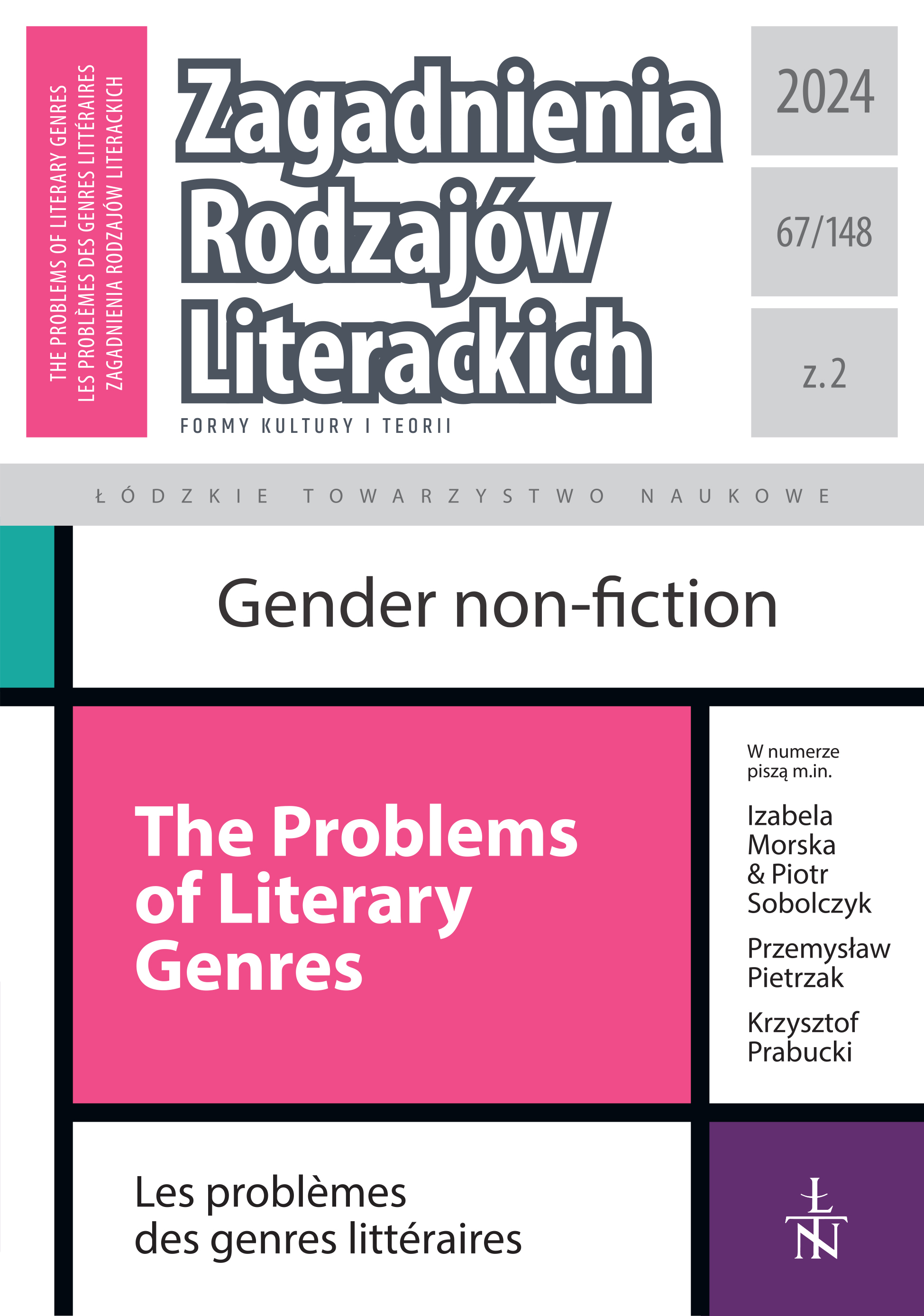University as the Source of Trauma: "Exhales from Unfishployment" by Piotr Sobolczyk and "Enter stage left. Her-story of Becoming Mother-academic at a Polish University" by Beata Karpińska-Musiał
DOI:
https://doi.org/10.26485/ZRL/2024/67.2/25Keywords:
Beata Karpińska-Musiał; Piotr Sobolczyk; trauma; university; epistemological crisis; resistance; autoethnographyAbstract
The article examines the university as a source of trauma through an analysis of two narratives of resistance: Exhales from Unfishployment by Piotr Sobolczyk and Enter stage left. Her-story of Becoming Mother-academic at a Polish University by Beata Karpińska-Musiał. Drawing on Pierre Bourdieu’s depiction of academia as a system of reproduction, the study highlights the punitive mechanisms faced by those who deviate from the neoliberal ideal of homo academicus, characterized by total dedication to institutional demands. Both authors, despite their commitment to academic life, recount public humiliation and professional ostracism for daring to maintain private lives outside the academy, as well as for demonstrating the type of broad education that includes, in addition to integrity and generosity of spirit, mastering multiple languages, engaging with international academic contexts, and maintaining high levels of professional mobility. The article underscores how structural constraints, fueled by neoliberal and ritualistic institutional practices, target individuals based on identity factors such as parenthood, queerness, or disabilities. Creative resistance emerges as a shared theme, manifesting in Sobolczyk’s poetry and Karpińska-Musiał’s autoethnographic prose. These works expose the oppressive ethos of academic labor and advocate for alternative narratives of freedom and resistance, including the queer art of failure, that challenge systemic unfairness. By engaging theorists like Bourdieu, Foucault, MacIntyre, Nussbaum, and Sontag, the article calls for a reimagining of academia as a humane and equitable space. It critiques the inefficiency of traumatizing talented academics, proposing instead a system where work-life balance and professional dignity prevail.
Downloads
References
Bourdieu Pierre (1988), Homo Academicus, przeł. P. Collier, Stanford University Press, Stanford [wyd. I: 1984].
Bourdieu Pierre, Passeron Jean-Claude (1990), Reproduction in Education, Society and Culture, przeł. R. Nice, Sage Publications, Londyn [wyd. I: 1970].
Ginsberg Allen (2001), Howl [w:] A. Ginsberg, Selected Poems 1947–1995, HarperCollins Publishers, Nowy Jork — The Poetry Foundation, www.poetryfoundation.org/poems/49303/howl [dostęp: 29.11.2024] [datowane: 1955–1956].
Halberstam Jack (2018), Przedziwna sztuka porażki, przeł. M. Denderski. Wydawnictwo Krytyki Politycznej, Warszawa [wyd. I: 2011].
Handbook of Autoethography (2022), red. T.E. Adams, S. Holman Jones, C. Ellis, wyd. 2, Routledge, Londyn.
Heller Nathan (2023), The End of the English Major, „The New Yorker”, 27 lutego, www.newyorker.com/magazine/2023/03/06/the-end-of-the-english-major [dostęp: 26.11.2024].
Kant Immanuel (1987), Co to jest Oświecenie? [w:] M. Łojek, Teksty filozoficzne dla uczniów szkół średnich, przeł. A. Landman, Warszawa 1987.
Karpińska-Musiał Beata (2021), Harcowanie na planie. Her-storia stawania się matką-akademiczką w polskim uniwersytecie, Wydawnictwo Episteme, Lublin.
Kelsky Karen (2015), The Professor Is In: The Essential Guide To Turning your Ph.D. Into a Job, Crown, Nowy Jork.
Kosińska Marta (2023), Matka akademiczka. Autoetnografia z peryferii, usytuowana matrylokalnie, „Teksty Drugie” nr 1.
Lakoff George, Johnson Mark (2010), Metafory w naszym życiu, przeł. i wstępem opatrzył T.P. Krzeszowski, Wydawnictwo Aletheia, Warszawa [wyd. I: 1980].
Marciniak Łukasz T. (2008), Stawanie się nauczycielem akademickim. Analiza symboliczno-interakcjonistyczna, „Przegląd Socjologii Jakościowej”, nr 4(2).
MacIntyre Alisdair (1977), Epistemological Crises, Dramatic Narrative and the Philosophy of Science, „The Monist” nr 60(4), www.jstor.org/stable/27902497 [dostęp: 29.11.2024].
Morska Izabela (2024), Niehonorowe doktoraty, splątane habilitacje, „Gdańsk Miasto Literatury” nr 20, miastoliteratury.com/aktualnosci/niehonorowe-doktoraty-splatane-habilitacje [dostęp: 26.11.2024].
Nawrocka Ewa (2012), Wszyscy jesteśmy przestępcami, „Solidarni2010.pl”, 12 maja, solidarni2010.pl/3147-prof-ewa-nawrocka-wszyscy-jestesmy-przestepcami.html [dostęp: 26.11.2024].
Nowak Andrzej W. (2023), Erudycja — niepotrzebna, niezbędna, „Teksty Drugie” nr 1.
Nussbaum Martha C. (2016), Nie dla zysku: dlaczego demokracja potrzebuje humanistów, przeł. Ł. Pawłowski, przedm. J. Kuisz. Fundacja Kultura Liberalna, Warszawa [wyd. I: 2010].
Rakowski Tomasz (2023), Jak (nie) pisać dużo? Założenia sprzeciwu wobec późnokapitalistycznej akademii a genealogie pisarstwa antropologicznego, „Teksty Drugie” nr 1.
Sobolczyk Piotr (2022), Wydechy z bezrybocia, Stowarzyszenie Pisarzy Polskich/Dom Literatury w Łodzi, Łódź.
Susan Sontag (1995), The Art of Fiction [wywiad], „The Paris Review” nr 137, www.theparisreview.org/interviews/1505/the-art-of-fiction-no-143-susan-sontag [dostęp: 26.11.2024].
Wiszowaty Marcin (2021), In mari vi(t)a tua — czyli zagadka „pomylonej” dewizy Uniwersytetu Gdańskiego, „Armaria”, 21 stycznia, armaria.info/?p=205 [dostęp: 29.11.2024].
Downloads
Published
How to Cite
Issue
Section
License
Copyright (c) 2024 Łódzkie Towarzystwo Naukowe and authors

This work is licensed under a Creative Commons Attribution-NonCommercial-NoDerivatives 4.0 International License.







